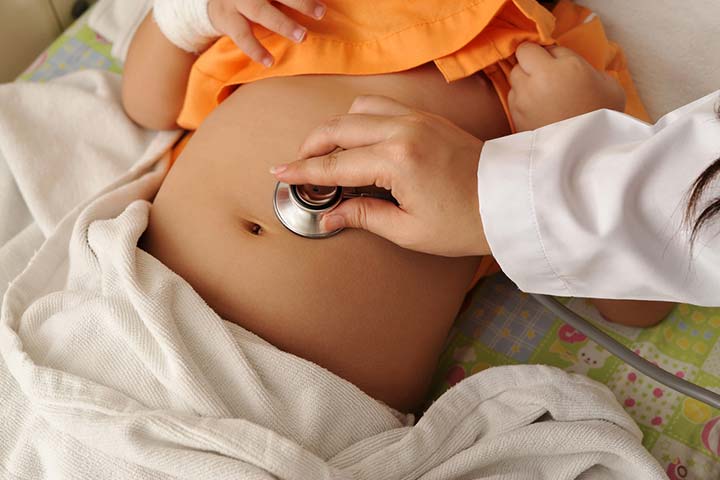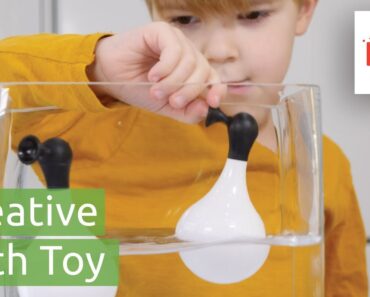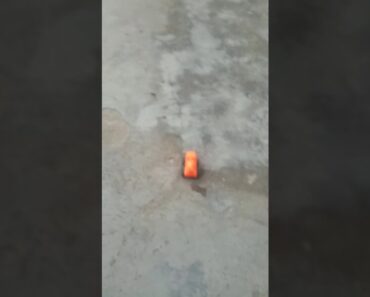Appendicitis is a painful inflammation of the appendix. It is a medical emergency that requires appendix removal surgery. Approximately 70,000 pediatric appendicitis cases are reported in the US per year, and 7% of people have undergone appendix removal in their lifetime.
The exact function of the appendix, a narrow, small, finger-shaped pouch that joins the colon (large intestine), is not known. Some researchers suggest that it is a useless remnant of evolution, while others believe it is a storehouse of good bacteria and can reboot the digestive system after diarrheal diseases.
Read this post to know about the causes, symptoms, complications, diagnosis, and treatment options for appendicitis in children.
Signs And Symptoms Of Appendicitis In Children
Abdominal pain is the primary symptom of appendicitis in most children. Appendicitis-related abdominal pain usually begins around the belly button and moves to the lower right-hand side of the abdomen. However, some children may have pain starting from the right side of the abdomen. The severity of abdominal pain increases over time in appendicitis.
Your child may feel increased pain while moving, coughing, sneezing, or deep breathing and the spread of pain throughout the abdomen may indicate a rupture of the appendix.
The other signs and symptoms of appendicitis may include
- Bowel movement changes such as constipation or diarrhea
The severity and type of symptoms may vary in each child. And it is recommended to seek medical care to diagnose and treat abdominal pain in children since it can be due to certain medical emergencies.
Causes And Risk Factors For Appendicitis In Children
Appendicitis may occur when the appendix is obstructed by something. Mucus, stool, parasites, or a bend or twist in the appendix can block the appendix in children. An obstructed (blocked) appendix can become inflamed and infected with bacteria.
Some children can get appendicitis followed by abdominal trauma. Positive family history and cystic fibrosis may increase the risk for appendicitis in children.
Complications Of Appendicitis
Complications of appendicitis may occur in untreated or unrecognized cases. An inflamed appendix can rupture and spill intestinal contents into the abdominal cavity. About 60% of children below five years and up to 90% of children below two years can have appendix rupture followed by appendicitis.
The ruptured appendix may cause an inflammation of the abdominal cavity, a condition called peritonitis, and abscess formation (pockets of pus outside the intestine) in the abdomen.
When To See A Doctor?
It is recommended to visit the emergency room for appendicitis since an infected appendix can burst or rupture. If you suspect appendicitis in your child, do not give them food or water before a visit to the doctor since an empty stomach speeds up surgical preparation if required.
Pain medications or any other medications are also not recommended for children with severe abdominal pain, possibly due to appendicitis. Increasing pain or rupture of the appendix may go unnoticed due to medication effects, and delay in medical care can lead to severe complications.
Diagnosis Of Appendicitis
A detailed medical history and physical examination are often recommended for the diagnosis of appendicitis in most children. The following tests are ordered to confirm the diagnosis.
- Abdominal ultrasound: This is the first diagnostic test done on children with suspected cases of Abdominal ultrasound helps visualize changes in the appendix, such as wall thickening and dilation during appendicitis.
- CT (computed tomography) scan: Doctors may order a CT scan if the appendix or inflammatory changes are not visible on ultrasound. This can also be done before surgical procedures. CT scans also help identify other causes of abdominal pain if the appendix is normal.
- Blood tests: Infections and inflammatory markers can be identified via blood analysis. This may also help rule out problems with abdominal organs such as the pancreas or liver.
- Urine tests: Urinalysis helps rule out any kidney or bladder infection that may mimic appendicitis symptoms.
MRI scans are also helpful to diagnose appendicitis. However, they are not often done since CT scan has high accuracy and is widely available and cost-effective.
Treatment For Appendicitis In Children
Appendicitis is a medical emergency requiring immediate management. Surgical removal of the appendix, known as appendectomy, is usually performed in most children. Intravenous (IV) fluids and are given before surgery to reduce the risk of infection. Some children may receive antibiotics instead of surgery if the appendix is unlikely to rupture. Doctors may decide the treatment based on the child’s age, symptoms, and health status.
Appendectomy can be done in the following ways.
- Laparoscopic appendectomy: This surgical procedure uses special tools and a camera to remove the appendix through small incisions made on the abdominal wall under general anesthesia. Laparoscopic surgeries are not done if a child has an appendix rupture.
- Traditional or open surgery: In this approach, the appendix is removed through an opening made on the abdominal wall under general anesthesia. Shunts (small tubes) are placed for a few days to drain pus from the abdominal cavity in case of appendix rupture.
Even if the appendix bursts and forms pus and the child is stable, some doctors may choose interval appendectomy (removing appendix later) over emergency appendectomy. In such cases, intravenous (IV) antibiotics are given, and the abscess is drained out for ten to 14 days. Appendectomy is done after the infection resolves, usually about six to eight weeks later.
Children who had appendix bursts may require more days of hospitalization and antibiotic treatment for a longer time. In addition, pain medications are prescribed to manage post-surgical pain. Usually, most children recover without any long-term effects.
Complications After Surgery
The following complications are possible after appendectomy in some children.
- Bowel obstruction (blocked bowel)
- Peritonitis if the appendix bursts into the abdominal cavity during the surgery
- Iatrogenic injury to the nearby organs in rare cases
Although it is possible to have these post-surgical complications after appendix removal, not all children develop them. You may discuss with the pediatric surgeon to know the individualized risk factors and concerns.
How To Prevent Appendicitis
There are no approved ways to prevent appendicitis in children. A high-fiber diet including fruits, vegetables, and whole grains may help reduce the risk of appendicitis. Seeking immediate medical care may help prevent complications of appendicitis in children.
Severe abdominal pain in children requires medical evaluation and treatment. Homecare measures and over-the-counter pain relievers are not recommended since they may lead to a delay in diagnosis. Seeking emergency medical care may help manage appendicitis before the appendix ruptures.


































